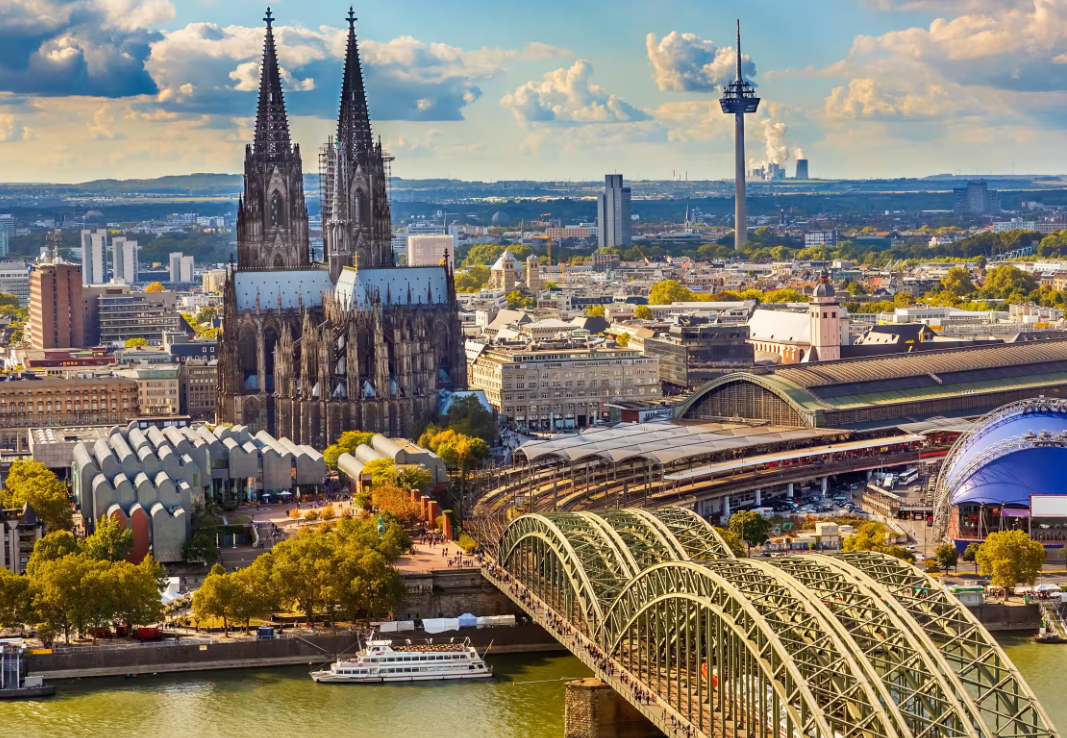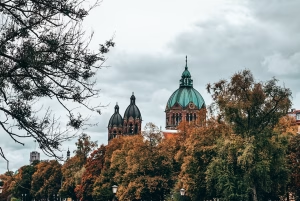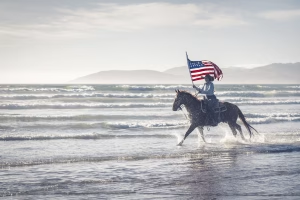Germany’s festivals are a vibrant tapestry woven from centuries of history, culture, and tradition. From the world-famous Oktoberfest to charming Christmas markets, these celebrations offer a glimpse into the country’s rich heritage.
Festivals play a vital role in German culture, serving as occasions for community bonding and cultural expression.
These celebrations also contribute significantly to local economies, drawing visitors from around the world.
Major Festivals in Germany
1. Oktoberfest
Date: 20th September to 5th October, 2025
Location: Munich, Bavaria
|
Origin |
Began in 1810 as a wedding celebration for Crown Prince Ludwig of Bavaria and Princess Therese of Saxony-Hildburghausen |
|
Main Attractions |
– Massive beer tents hosting thousands of people |
|
Cultural Highlights |
– Celebration of Bavarian culture |
|
Activities |
– Carnival rides and games |
|
Atmosphere |
Unique camaraderie as strangers bond over shared experiences and steins of beer in Oktoberfest |

2. Christmas Markets
Date: Late November to December 24th
Location: Nuremberg, Dresden, Munich, and other German cities
|
Main Attractions |
– Decorated stalls and twinkling lights |
|
Foods |
– Bratwurst |
|
Handicrafts |
– Woodcarvings |
|
Best Time to Visit |
Weekends and early evenings for a vibrant atmosphere; visit before Christmas Eve to avoid last-minute rush |
|
Atmosphere |
Festive, magical ambiance with a blend of traditional German culture and holiday cheer |

3. Carnival (Fasching)
Date: Late winter, before Lent
Location: Various regions, notably Cologne, Aachen, Düsseldorf, Mainz
|
Main Attractions |
– Shrove Monday parades |
|
Regional Highlights |
– Cologne: Massive Shrove Monday parade (1.5 million visitors) |
|
Costumes |
Elaborate, colorful, and fanciful outfits worn by participants |
|
Atmosphere |
Festive, vibrant celebrations showcasing regional traditions |

Regional Festivals to Experience
1. Rhine in Flames
Date: Various dates in the summer
Location: Along the Rhine River, including Bonn, Linz, Koblenz
|
Main Attractions |
– Spectacular fireworks synchronized with music and lighting effects |
|
Cultural Highlights |
– Traditional food stalls |
|
Best Experience Tips |
– Book a river cruise for optimal views |
|
Atmosphere |
Festive, vibrant, and visually dazzling |

2. Wurstmarkt
Date: September 12th – 16th and 19th – 22nd, 2025
Location: Bad Dürkheim, Rhineland-Palatinate
|
Main Attractions |
– Wine tastings featuring over 150 wines from the Bad Dürkheim region |
|
Fairground |
– Rides and a large Ferris wheel |
|
Historical Significance |
Wurstmarkt roots dating back to the 12th century, were originally a market for farmers and wine growers. |
|
Atmosphere |
Festive and family-friendly with a mix of wine, food, and entertainment |
Berlin Festival of Lights
Date: October
Location: Various locations in Berlin
|
Main Attractions |
– Light installations, projections, and performances showcasing global artists’ creativity |
|
Special Events |
– Guided tours for a deeper appreciation of the light art |
|
Atmosphere |
The magical transformation of the city into a kaleidoscope of light offers a unique artistic experience during the Berlin Light Festival. |
|
Tips |
Plan your route to visit key landmarks and installations, and visit in the evening for the full effect |

Unique Cultural Experiences at Festivals
Traditional Foods and Drinks
Signature dishes to try at festivals:
-
Bratwurst: A classic German sausage often served with mustard and sauerkraut
-
Sauerbraten: A slow-cooked pot roast marinated in vinegar, water, and spices
-
Schweinshaxe: A roasted pork knuckle, typically served with potatoes and sauerkraut
-
Apfelstrudel: A traditional pastry filled with apples, cinnamon, sugar, and sometimes raisins or nuts
Local beverages to sample:
-
Beer: Germany is renowned for its beer culture, with festivals like Oktoberfest showcasing a variety of brews
-
Glühwein: A mulled wine infused with spices, popular at Christmas markets
-
Federweisser: A young, sweet wine available in the fall, often served with zwiebelkuchen (onion tart)
Travel Tips for Festival Goers
|
Tip |
Details |
|---|---|
|
Plan Your Accommodation Early |
Many festival cities get fully booked, especially during peak times like Oktoberfest and Christmas markets. Book in advance to secure good deals. |
|
Dress Appropriately for the Weather |
German festivals are often outdoors, so pack accordingly. For Oktoberfest, consider wearing traditional Bavarian attire (lederhosen or dirndl). |
|
Bring Cash |
While credit cards are accepted in many places, small vendors at festivals often prefer cash. Bring enough cash in small denominations. |
|
Public Transport is the Best Option |
Most cities have excellent public transport systems. Avoid driving as parking can be limited and expensive during festivals. |
|
Arrive Early to Get the Best Spot |
For major events like Rhine in Flames or parades in Cologne, arriving early ensures you get a prime viewing spot, especially for fireworks or performances. |
|
Embrace Local Traditions and Etiquette |
Respect local customs, such as removing shoes before entering homes or temples and dressing modestly at religious or cultural events. |
|
Avoid Overindulging in Alcohol |
While German festivals like Oktoberfest are known for their beer, it’s important to pace yourself, especially in crowded settings. Drink water between alcoholic beverages. |
|
Buy Tickets for Popular Events in Advance |
Some events like concerts or special performances may require booking. Check the festival website for ticketing information and deadlines. |
|
Be Prepared for Crowds |
Festivals like Oktoberfest and Christmas markets attract large crowds. Be patient and be mindful of personal space. |
|
Take Advantage of Local Food and Souvenirs |
Sample traditional foods like bratwurst, pretzels, and sausages, and consider buying handmade crafts like wooden ornaments or pottery as souvenirs. |
|
Practice Basic German Phrases |
While many people speak English, learning a few key phrases in German can enhance your experience and show respect for the local culture. |
Why Choose OneVasco?
OneVasco makes visa applications effortless. Our expert team manages the entire process, allowing you to focus on your journey. Enjoy stress-free travel with fast visa approvals.
-
Expert and Personalized Support
-
Efficient and Hassle-Free Process
-
Real-Time Tracking and Updates
-
Transparent Communication
-
Trusted by Millions
FAQs
1. How do German festivals differ from those in other European countries?
German festivals are unique due to their strong ties to regional history, culture, and traditions. Unlike more generalized European festivals, German celebrations are often deeply rooted in specific local customs and heritage.
2. Can you recommend any must-visit festivals in Germany?
-
Oktoberfest (Munich): World’s largest beer festival celebrating Bavarian culture.
-
Christmas Markets (Nuremberg, Dresden, Munich): Festive holiday atmosphere with handicrafts and treats.
-
Cologne Carnival: The largest and oldest carnival parade in Germany with costumes and floats.
-
Wurstmarkt (Bad Dürkheim): Wine lovers’ paradise with 150+ wines and traditional German food.
-
Berlin Festival of Lights: Stunning light installations illuminating iconic landmarks.
3. How do German festivals incorporate local culture and traditions?
German festivals are deeply intertwined with local culture and traditions, serving as vibrant expressions of regional heritage. This incorporation of local elements can be seen in various aspects of the celebrations through food & drinks, music, dance, costumes, etc.
4. Are there family-friendly festivals in Germany?
Absolutely! Many German festivals cater to families and offer a range of activities and attractions suitable for all ages like Oktoberfest, Christmas Markets, Wurstmarkt, etc.





















